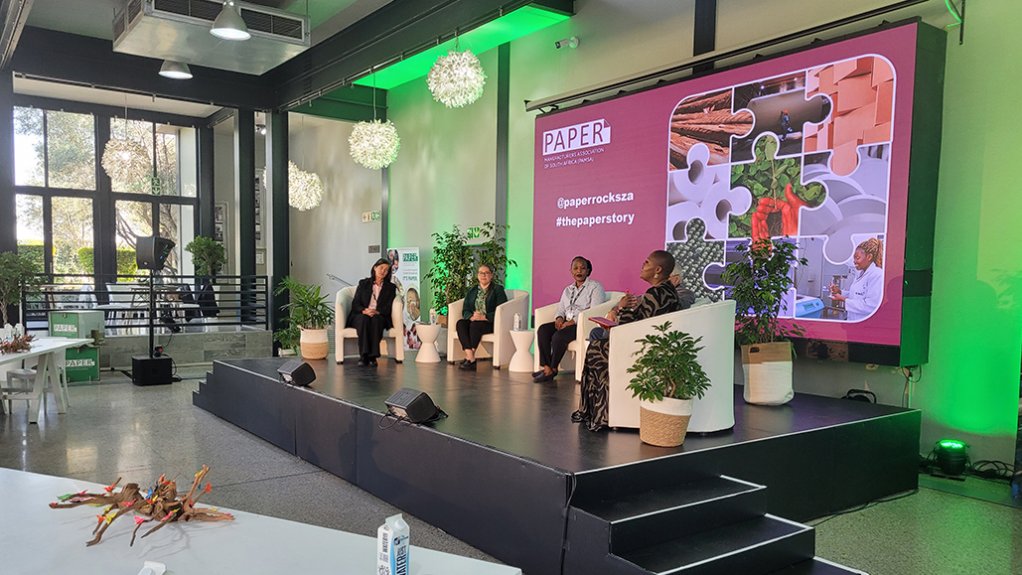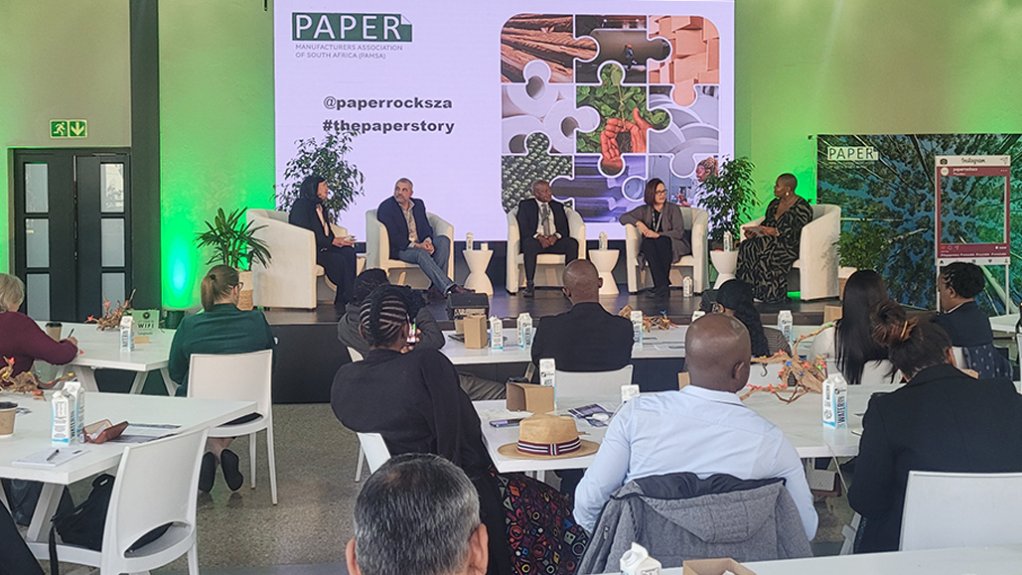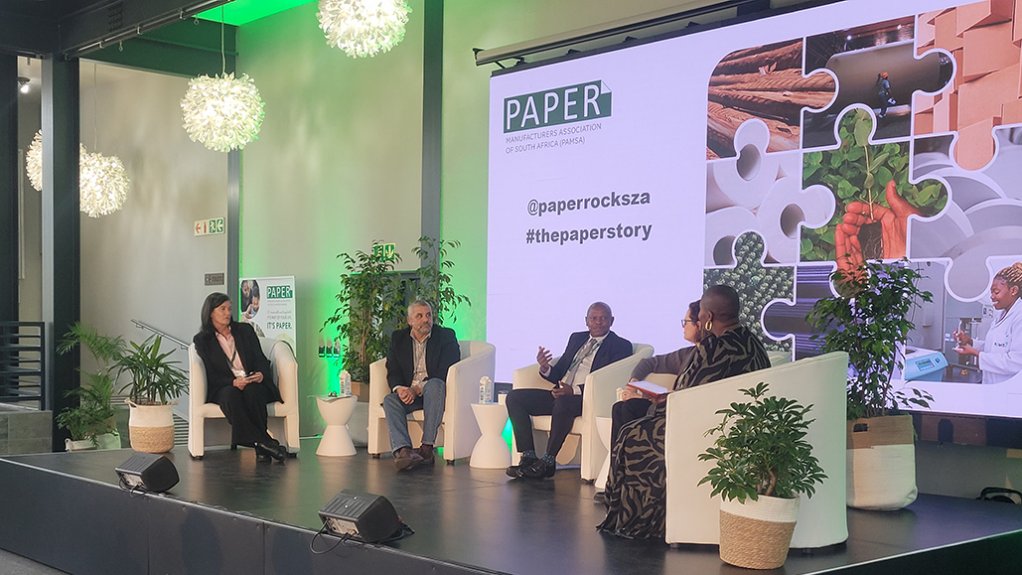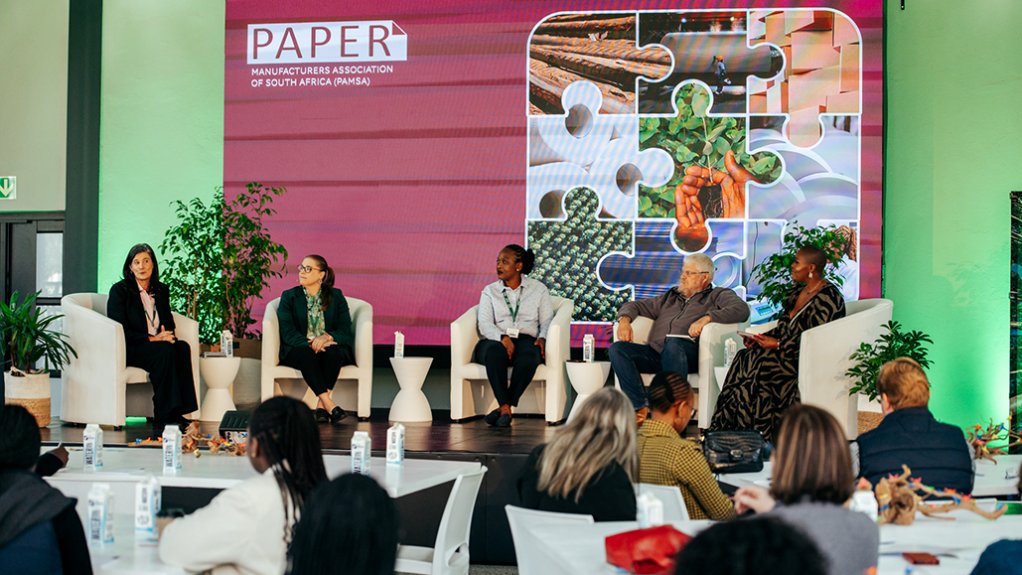Pamsa stresses comprehensive sustainability of forestry, papermaking





Trees used to make paper in South Africa are specifically farmed, as tree growing and paper making processes are audited, certified, and sustainability managed
Pamsa executive director Jane Molony, Woolworths packaging senior Don Mac Farlane, Sappi technology centre manager Nelson Sefara, Mpact customer technical services and sustainability manager Valeksa Cloete, 702 presenter Gugulethu Mhlungu
There are a number of different certification standards that are developed from a global level to emphasise best practices for forestry companies to follow
Pamsa executive director Jane Molony, Sappi head of sustainability and investor relations Tracy Wessels, Mondi Zimele GM Nelly Ndlovu, Outdoor Escapes conservationist Tim Neary, 702 radio presenter Gugulethu Mhlungu
Industry association the Paper Manufacturers Association of South Africa (Pamsa) has emphasised the environmental, economic and social sustainability benefits of the local papermaking and recycling industry.
Speaking at a roundtable event, in Johannesburg, on July 5, Pamsa executive director Jane Molony stressed the sustainability impact the forestry and papermaking and recycling industry can have on the environment, economy and livelihoods of South Africans.
Further, she also discussed and dismissed misconceptions about the perceived environmental impact of the industry.
“One of our largest issues with these misconceptions is the claim that paper processes are not as environment-friendly as digital processes, which is not true”.
Molony also pointed out the negative environmental impact digital technologies – such as data and cloud storage – can have. This is owing to the fact that data banks and similar infrastructure require intensive cooling technologies and energy to maintain operations.
This has a defining impact in South Africa in particular, as a large portion of energy produced in the country is produced from coal, she added.
“The energy we use in the paper industry, through combining heat and power, is up to 50% less carbon-intensive than that of coal, so it’s definitely not greener on the screen”.
The second misconception she pointed out was that the timber and paper industries contribute to deforestation.
She noted that trees used to make paper in South Africa are specifically farmed and that these tree growing and papermaking processes are audited, certified and sustainability managed.
“Deforestation is when you cut trees down, and you don't actually replant them. Deforestation normally happens in other industries such as agriculture, but the papermaking industry definitely does not deforest in this country”.
She added that timber plantations only represent 7% of the planet’s forest area, but provide about 50% of wood for industrial purposes.
This ranges from applications in aviation, textiles, paper, pharmaceuticals, furniture, to personal hygiene and more.
She also emphasised that improving biodiversity can also provide more sustainable ecosystems for the natural environment to benefit from.
“We mitigate monoculture by conserving grasslands. Some of the best managed wetlands are managed by pulp and paper companies Sappi and Mondi, and there are tracks of land that are conserved”.
Molony also discussed the impact that carbon sequestration can provide for the papermaking and recycling industries in terms of environmental sustainability
“Trees naturally remove carbon dioxide (CO2) out of the atmosphere and store it in the wood while they are growing. When trees are younger, they store more CO2 than when they are older. Very old trees are already decaying, and they have more chance of being burnt. So it’s important to sustainably manage forests, even natural forests”.
She also noted that carbon sequestration is also relevant for carbon taxes that are implemented locally.
“When we pay carbon taxes, the carbon stored in our products and trees can be deducted from the carbon tax. Even the South African Revenue Service and National Treasury recognise the mitigating effect of trees and forest products in the country.”
Sappi head of sustainability and investor relations Tracy Wessels also pointed out the carbon-reduction benefits sustainably managed forests can provide.
“Old trees don’t grow and don’t require as much carbon, so a sustainably managed forest will be continuously harvesting and rotating and maintaining a continuous growth cycle. That’s why you sequester more carbon in a sustainably managed working forest compared to a natural forest. As a productive material, a sustainably managed forest sequesters far more carbon than a natural forest.”
Wessels also stressed the importance of the renewability of trees, and its suitability as a renewable resource in a circular economy, as all products processed from trees can be recycled and are biodegradable.
“Sustainable forestry has been in a long process of development. It's one of the few industries that has such a high level of regulation, certification, and processes and procedures for how we should manage our forests that take into account real sustainability.
“Sustainability is about balancing people, prosperity and the environment. The sustainable forestry management practices that we have that guide us throughout the certification processes and balances all of these three aspects.”
In addition, she added that sustainable forestry also places a focus on conservation and biodiversity, which is part of Sappi’s forestry management protocol.
“We identify areas with conservation venue. We are setting those areas aside, and we protect those for biodiversity purposes. We also do this because wood creates prosperity and has value. If one wants to be a certified forestry company, there’s a lot of third-party verifications that make sure that these protocols are being followed.”
Wessels also pointed out that, for the forestry industry, there are a number of different certification standards that are developed from a global level to emphasise best practices that forestry companies follow.
Mondi Zimele GM Nelly Ndlovu focused on sustainability aspects that impact peoples livelihoods and communities, and stressed the importance of transferring skills and knowledge on planting and harvesting trees to community members.
“While we have our own forest plantations, we still have communities that exist around us. We ask ourselves how do we than transfer the skills and the knowledge that we have, so that we create sustainability within our communities.
“This stems from working with our communities so they can plant trees in a sustainable manner, and they can become growers themselves. This helps provide a market for those growers so they can sustaimably plant and sell timber to companies like us, therefore providing jobs.”
Conducting this skills and knowledge transfer process can also contribute to developing the paper making supply chain.
She also pointed out that this can help communities and small businesses involved in the paper making process comply with environmental regulations, such as water use licenses, when planting and harvesting trees.
Article Enquiry
Email Article
Save Article
Feedback
To advertise email advertising@creamermedia.co.za or click here
Announcements
What's On
Subscribe to improve your user experience...
Option 1 (equivalent of R125 a month):
Receive a weekly copy of Creamer Media's Engineering News & Mining Weekly magazine
(print copy for those in South Africa and e-magazine for those outside of South Africa)
Receive daily email newsletters
Access to full search results
Access archive of magazine back copies
Access to Projects in Progress
Access to ONE Research Report of your choice in PDF format
Option 2 (equivalent of R375 a month):
All benefits from Option 1
PLUS
Access to Creamer Media's Research Channel Africa for ALL Research Reports, in PDF format, on various industrial and mining sectors
including Electricity; Water; Energy Transition; Hydrogen; Roads, Rail and Ports; Coal; Gold; Platinum; Battery Metals; etc.
Already a subscriber?
Forgotten your password?
Receive weekly copy of Creamer Media's Engineering News & Mining Weekly magazine (print copy for those in South Africa and e-magazine for those outside of South Africa)
➕
Recieve daily email newsletters
➕
Access to full search results
➕
Access archive of magazine back copies
➕
Access to Projects in Progress
➕
Access to ONE Research Report of your choice in PDF format
RESEARCH CHANNEL AFRICA
R4500 (equivalent of R375 a month)
SUBSCRIBEAll benefits from Option 1
➕
Access to Creamer Media's Research Channel Africa for ALL Research Reports on various industrial and mining sectors, in PDF format, including on:
Electricity
➕
Water
➕
Energy Transition
➕
Hydrogen
➕
Roads, Rail and Ports
➕
Coal
➕
Gold
➕
Platinum
➕
Battery Metals
➕
etc.
Receive all benefits from Option 1 or Option 2 delivered to numerous people at your company
➕
Multiple User names and Passwords for simultaneous log-ins
➕
Intranet integration access to all in your organisation





















